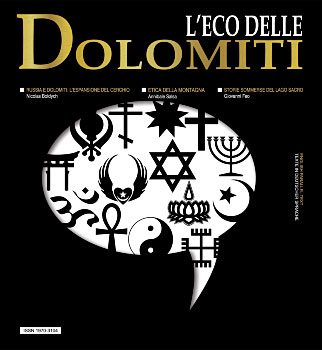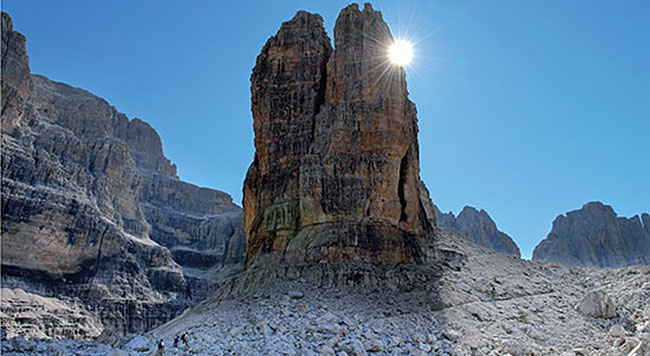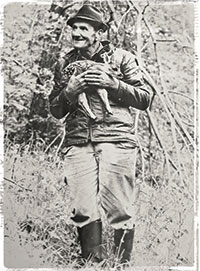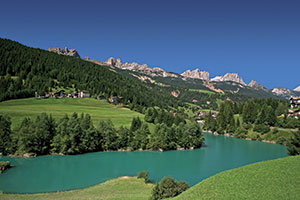

THE ETHICS OF THE MOUNTAINS
Annibale Salsa

We are living through an age of crisis, involving both our traditional values from the past and our common ethics based on indisputable universal principles, and this leads us to ask with a growing sense of urgency what we can now use to underpin a new system of morality. It is a task we must undertake while using language which is easily accessible to the younger generation.
When confronting all the uncertainties of this post-modern age, we may well find that the mountains can come to our aid. Mountains have always been, and continue to be, the most important metaphor for human life. This role is often expressed in the form of rhetoric, and has provided mankind with the basic material for constructing the great stories and religious epics of antiquity (the myths, legends and oral traditions).

From the woodland tales of the pagan world, with their pantheistic background, through to the great written scriptures with their universal, monotheistic approach (Judaism, Christianity, Islam), the icon of the sacred mountain has played its role in providing a bridge between the earthly and celestial realms. There are many different elements congregating around such a powerful symbol: elements which could provide the basis for constructing a material and spiritual value system.
In the first instance, there is the idea of limits. In our technocratic society, with its “no limits” culture and emphasis on performance targets, the image of the mountain provides an effective moral reminder. One of the great moral ills of our society, deriving from a constant input of communications, and especially from the insidious and persuasive role of the media, is the notion that we can drive ourselves to overcome any limits, whether they be physical, sporting, technical, economic or financial.
Every single thing and experience is measured and evaluated in purely quantitative terms, without an examination by our moral consciousness. Current technology provides us with the tools to master our environment and overcome limits, giving us a heady feeling of conquering our own mortality. Everything is both possible and permitted. Every barrier can be overcome: from tiredness to knowledge. 
At this point, a judicious introduction to the mountains could be a useful lesson for life, especially for the younger generations. Goethe wrote that the mountains are strict teachers that produce silent followers. Indeed silence is the very essence of the language of the mountains: a silence in which the noise of today produces discomfort and disorientation.
The Freiburg philosopher, Martin Heidegger, living in his cabin in the Black Forest, deduced that silence is as much of an extreme form of language as poetry. They both allow something to be said that the ordinary language of speech cannot communicate: a way of interacting genuinely with the world. A mountain treated with respect is a place where nature bestows its maximum benefits, both at a physical and mental level.
Indeed, the mountain helps us to overcome that disjunction between body and mind which, at lower levels, makes our lives so alienating and schizophrenic. The mountain exerts its therapeutic power from the point that it draws us away from our trivial daily concerns and helps us to discover who we are, making us confront our inner selves without falsehood or pretence, and without the usual filter of false conscience. At this point, many of our fragile psychological defences reveal their vulnerability. The benefits are in terms of solidarity and social cohesion, which act as antidotes to the malaise of egoism.
The challenges of surviving in the mountain environment encourage that spirit of unity which a utilitarian society tries to reject. Fragile eco-systems, like those in the mountains, help us to understand the basic elements of the human condition and all the weaknesses of its systems and constructs. However, it should be admitted frankly and without hypocrisy, that the image of the mountain is sometimes put to questionable rhetorical use, being depicted almost as the source of all original purity, far removed from any contaminating influences.

The mythology built up around the purifying, cathartic character of the mountain has fed into the mystic approach to war and many forms of celebratory epic. For many hundreds of years in Europe, the Alps and the Pyrenees acted as a battleground between opposing armies, intent on defending a strategic natural boundary: a frontier perceived as “sacred” and as a place for cleansing with blood, with disturbing echoes of D’Annunzio. The mountains, whether they be the Alps or the Himalayas, the Pyrenees or the Karakorams, the Andes or the Balkans, should be perceived, on the contrary, as places of openness and ways of passage, porous connections between races and languages.
The forthcoming celebrations in the Trentino region to commemorate the outbreak of the Great War should take advantage of this distance in time to help us escape, once and for all, from the conflicting rhetoric of nationalism, irredentism, and patriotic chauvinism. The separation of the concepts of the State and the Nation, from the mid-19th century onwards, created confusion and misunderstanding in the Alpine regions and led to unjustifiable suffering.
 In the border-free Europe of today, and in the face of the current irresponsible climate of Euro-scepticism, we should take the opportunity to clarify, in a calm and rational way, the distinction between invaders and defenders, occupiers and the occupied. In these instances also, the lesson of limits can serve as a useful admonition in teaching our youngsters to face up to reality. It can help to keep their feet on the ground like the old mountain-dwellers, without the distorting influence of misleading ideologies. The Myth of Icarus - that is to say, the physical, mental and spiritual ambition to transcend our earthly limitations - must be accompanied by a responsible ethical attitude towards nature and our own selves.
In the border-free Europe of today, and in the face of the current irresponsible climate of Euro-scepticism, we should take the opportunity to clarify, in a calm and rational way, the distinction between invaders and defenders, occupiers and the occupied. In these instances also, the lesson of limits can serve as a useful admonition in teaching our youngsters to face up to reality. It can help to keep their feet on the ground like the old mountain-dwellers, without the distorting influence of misleading ideologies. The Myth of Icarus - that is to say, the physical, mental and spiritual ambition to transcend our earthly limitations - must be accompanied by a responsible ethical attitude towards nature and our own selves.